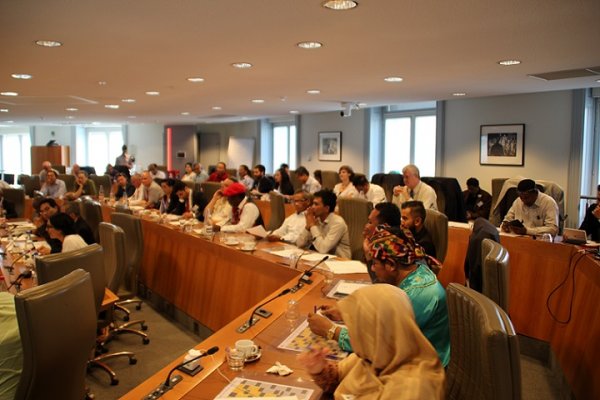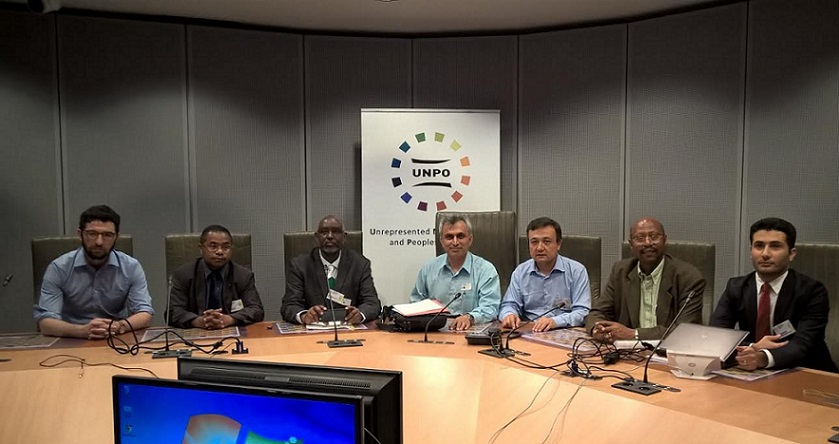| UNPO |
| Jul 8, 2015 |
| Brussels |
 |
|
On July 2015, UNPO Members gathered at the Flemish Parliament in Brussels for the final day of the Organization’s XII General Assembly. The agenda consisted of a debate and adoption of a General Resolution aimed at guiding the work of UNPO until the next General Assembly, as well as of the election of a new President, Vice-President and 9 Presidency Members. The final session, chaired by newly elected UNPO President Mr Nasser Boladai of West Balochistan, ended with an interactive debate between UNPO Members and the Secretariat on the challenges and opportunities facing the day-to-day work of the Organization.
After having declared the final day of UNPO’s XII General Assembly open, UNPO President Mr Ngawang Choephel gave the floor to Mr Enghebatu Togochog, the Head of Delegation of Southern Mongolia, to present the General Resolution draft as prepared by the Drafting Committee. Subsequently, through the mediation of the President, Members had the opportunity to provide input and suggestions for amendments to specific articles of the Resolution. An additional article was added to the draft, addressing regional organizations and their need to protect and promote human rights.
Following the amendments and adoption of the final version of the General Resolution, the Head of Delegation of the Afrikaners, Dr Pieter Groenewald, presented the nominations for the new Presidency: Tibet, Taiwan, East Turkestan, Crimean Tatars, Iranian Kurdistan, Afrikaners, Khmer Krom, Oromo and West Papua. As no alternative list had been put forth, and the aforementioned list had received the required majority of support, the composition of the new Presidency was declared as such. Mr Nasser Boladai from West Balochistan was then elected the new President of UNPO and Mr Abdirahman Mahdi from Ogaden the new Vice-President, with 2/3 of the voting-eligible Members supporting their nomination.
 |
|
Mr Boladai, who following his election was tasked to take on the role of chairing the meeting, first of all expressed his gratefulness for being entrusted with the presidential mandate. He opened his speech by stressing his desire to set a new agenda for UNPO, and his commitment to create and achieve more for the organization. He underlined the fact that all UNPO Members, despite facing very different environments and situations, aim for the same goal - dignity. Finally, Mr Boladai thanked General Secretary Mr Marino Busdachin and the UNPO Secretariat, and congratulated the new Vice-President, Mr Mahdi on his election.
In accord with the UNPO Covenant, the XII Session of the General Assembly extended the mandates of the Organization’s General Secretary and the Treasurer, without an election. The next election for these key positions will take place during the XIII Session.
In the afternoon session of the Assembly, Dr Fiona McConnell from Oxford University provided the GA participants with a presentation of the renowned university’s new partnership with UNPO – a training program entitled “Training diplomats from Unrepresented Nations: capacity building for effective UN lobbying”, which will be available for UNPO Members throughout 2015 and 2016. Following the presentation of Dr McConnell, UNPO Program Manager Ms Johanna Green and Program Coordinator Ms Iva Petkovic spoke about the activities of the Secretariat, current UNPO programs and projects in Brussels and beyond, and addressed a round of statements, questions and comments raised by the Members.
The General Resolution as adopted on the occasion of the XII Session of the UNPO General Assembly:
XII Session of the UNPO General Assembly
General Resolution
On the occasion of the XII Session of the UNPO General Assembly, the following general resolution was adopted on 4 July 2015 in Brussels, Belgium:
Preamble
Expressing its solidarity with UNPO Members and other victims of oppression, violence and discrimination who are struggling to gain respect for their human rights and fundamental freedoms worldwide;
Reiterating all members’ commitment to the Organization’s fundamental principles: democracy, non-violence, human rights, self-determination, tolerance and environmental protection, as expressed in the Covenant;
Reaffirming its continued engagement with the international community and expressing serious concern with regards to the lack of opportunities for political minorities and unrepresented nations and peoples to be heard;
Regretting that over 20 years after the adoption of the Declaration on the Rights of Persons Belonging to National or Ethnic, Religious and Linguistic Minorities, states continue to commit grave and systematic human rights violations against other nations and minorities;
Solemnly proclaiming the necessity to fully investigate, denounce and redress gross human rights violations against nations and indigenous peoples worldwide, which are too often hidden from the world or ignored by the media;
Affirming the importance of working to give all nations and ethnic communities the opportunity to have a say in the decisions that concern their territory, culture, language, heritage, environment and people.
The UNPO General Assembly:
1. Calls upon the international community to recognise that the 21st century presents the world with new challenges in matters of human security, the environment, the economy, social welfare, and culture, affecting nations and peoples who are not adequately represented in international fora, thus underscoring the importance and urgency of UNPO’s work, which embraces the concepts of individual and collective rights;
2. Calls upon intergovernmental organizations such as the European Union, African Union, ASEAN, Arab League, Organization of American States, Melanesian Spearhead Group, SAARC to honour their human rights commitments and respect the rights of all nations to self-determination;
3. Deplores that the 21st century is still facing contemporary forms of slavery including bonded labour, child slavery and sexual exploitation;
4. Strongly condemns the continuous human rights violations committed against Members in the form of arbitrary arrests and detentions, torture, enforced disappearances and extra-judicial killings, as well as all forms of discrimination;
5. Severely condemns the reprisals facing UNPO Members engaging in political activities, notably through the adoption of anti-terrorism laws that allow for more severe restrictions of personal liberty;
6. Further condemns the reprisals faced by members of the diaspora who lobby for their people, consisting in intimidations, threats and sometimes actual violence or arbitrary arrests of family members or friends still in their homeland;
7. Also condemns the lack of political will many UN Member States show towards the protection of their environment, of which areas are often sold off solely for financial reward, to the expense of future generations and particularly to the detriment of indigenous peoples, who lose traditional lands that they have inhabited for centuries, and are further punished under the pretext of environmental protection;
8. Denounces the fact that human rights discussions, fora and meetings of relevant UN bodies are restricted in their access, to the extent that this access is often completely denied to representatives of stateless nations;
9. Insists that the UN Human Rights Council take a more proactive role in supporting the rights of stateless peoples and nations, in particular for access to Special Procedure mandate-holders;
10. Urges the international community and especially the United Nations to allow de facto states to be recognised as independent states;
11. Encourages relevant organizations and Member States to work for the preservation and promotion of minority cultures and languages, which can be a source of enrichment not only for the relevant communities but for all;
12. Calls upon states to demilitarize territories of indigenous nations, end population transfers, implement the relocation of outside settlers, cease all exploitation of their lands without prior and informed consent, and continue with the effective implementation of agreements signed by indigenous peoples’ and states’ representatives.





 Beyond
Great Walls: Environment, Identity, and Development on the Chinese
Grasslands of Inner Mongolia
Beyond
Great Walls: Environment, Identity, and Development on the Chinese
Grasslands of Inner Mongolia China's
Pastoral Region: Sheep and Wool, Minority Nationalities, Rangeland
Degradation and Sustainable Development
China's
Pastoral Region: Sheep and Wool, Minority Nationalities, Rangeland
Degradation and Sustainable Development The
Ordos Plateau of China: An Endangered Environment (Unu Studies on
Critical Environmental Regions)
The
Ordos Plateau of China: An Endangered Environment (Unu Studies on
Critical Environmental Regions)